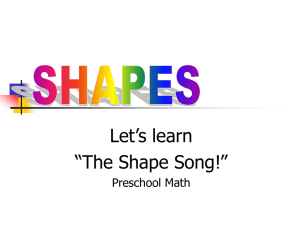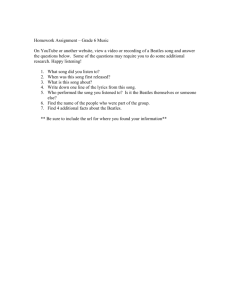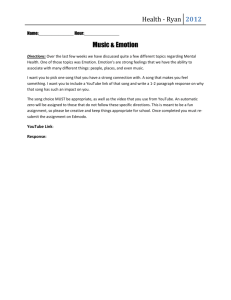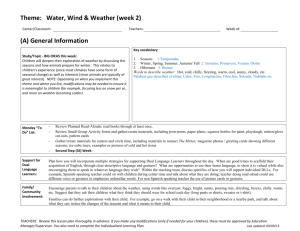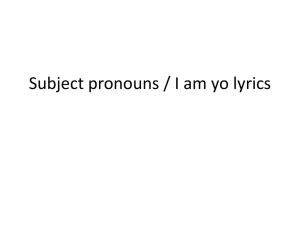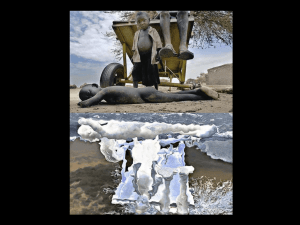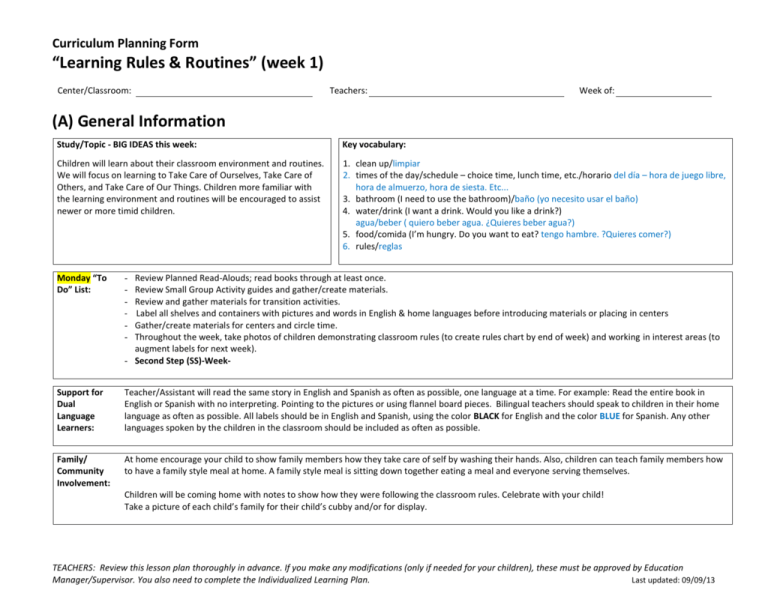
Curriculum Planning Form
“Learning Rules & Routines” (week 1)
Center/Classroom:
Teachers:
Week of:
(A) General Information
Study/Topic - BIG IDEAS this week:
Key vocabulary:
Children will learn about their classroom environment and routines.
We will focus on learning to Take Care of Ourselves, Take Care of
Others, and Take Care of Our Things. Children more familiar with
the learning environment and routines will be encouraged to assist
newer or more timid children.
1. clean up/limpiar
2. times of the day/schedule – choice time, lunch time, etc./horario del día – hora de juego libre,
hora de almuerzo, hora de siesta. Etc...
3. bathroom (I need to use the bathroom)/baño (yo necesito usar el baño)
4. water/drink (I want a drink. Would you like a drink?)
agua/beber ( quiero beber agua. ¿Quieres beber agua?)
5. food/comida (I’m hungry. Do you want to eat? tengo hambre. ?Quieres comer?)
6. rules/reglas
Monday “To
Do” List:
-
Review Planned Read-Alouds; read books through at least once.
Review Small Group Activity guides and gather/create materials.
Review and gather materials for transition activities.
Label all shelves and containers with pictures and words in English & home languages before introducing materials or placing in centers
Gather/create materials for centers and circle time.
Throughout the week, take photos of children demonstrating classroom rules (to create rules chart by end of week) and working in interest areas (to
augment labels for next week).
- Second Step (SS)-Week-
Support for
Dual
Language
Learners:
Teacher/Assistant will read the same story in English and Spanish as often as possible, one language at a time. For example: Read the entire book in
English or Spanish with no interpreting. Pointing to the pictures or using flannel board pieces. Bilingual teachers should speak to children in their home
language as often as possible. All labels should be in English and Spanish, using the color BLACK for English and the color BLUE for Spanish. Any other
languages spoken by the children in the classroom should be included as often as possible.
Family/
Community
Involvement:
At home encourage your child to show family members how they take care of self by washing their hands. Also, children can teach family members how
to have a family style meal at home. A family style meal is sitting down together eating a meal and everyone serving themselves.
Children will be coming home with notes to show how they were following the classroom rules. Celebrate with your child!
Take a picture of each child’s family for their child’s cubby and/or for display.
TEACHERS: Review this lesson plan thoroughly in advance. If you make any modifications (only if needed for your children), these must be approved by Education
Manager/Supervisor. You also need to complete the Individualized Learning Plan.
Last updated: 09/09/13
(B) Materials to Enhance Children’s Play
Blocks
Dramatic Play
Unit blocks (3-4 different shapes), Cardboard blocks,
animals or people, informational book with illustrations
of simple buildings and structures, paper and colored
pencils, photos of bridges or buildings.
Toys and Games
Cups, plates, utensils, tablecloth, play food, dressup clothes and accessories for boys and girls, baby
dolls (ethnicities of children in class), doll clothes,
writing materials and pads, 2 telephones, small
telephone book.
Colored teddy bears, tongs, duplos, magna tiles,
pegged puzzles, wooden framed puzzles, nesting
cups, pegs & pegboards, lotto, collection of buttons,
clipboard with paper and pencil, and
number/counting books.
Art
Library/Writing
Discovery/Science
Finger or tempera paint (2 colors), paintbrushes,
palette for paints, cardboard, smocks, collage materials,
glue sticks, crayons, colored pencils, cardstock, pipe
cleaners, chalk, paper, playdough (1 color), dough tools,
cutter.
This week’s small group books, books about school,
families, friendships, alphabet and numbers,
flannel board and pieces, unlined paper, letter
stamps, envelopes, pens, pencils.
Collection of natural materials (leaves, rocks, sticks,
etc), plant, balance scale, magnifying glass, mirrors,
books with a variety of textures, small clipboards,
paper, colored pencils, and magazines.
Sand and Water
Music and Movement
Pails, shovels, molds, cups of different sizes, spoons,
funnels, clear bottles, smocks, towel, child sized dust
pan and broom.
Scarves, tambourines, maracas, Second Step CD,
IMIL CD, and Kids In Motion CD.
Computers
Two computers, four chairs, mouse, timer, sign-up
list.
Outdoors
Cooking
Sand box with buckets and shovels, water table, play structure, balls, colored paper and chalk, variety of
books, foam blocks, drinking water, and 3 classroom rules poster.
(C) Group Experiences
Monday
Arrival
Opening
Circle
Movement
Tuesday
Wednesday
Thursday
Friday
Arrival: Puzzles, paper with
crayons, nesting cups.
Arrival: Puzzles, paper with
crayons, nesting cups.
Arrival: Puzzles, paper and
colored pencils, magna
tiles.
Arrival: Puzzles, dark paper
with chalk, pegs &
pegboards.
Morning Circle: Play
“School Family” &
Welcome Song – Second
Step CD #1. Help children
share their names.
Morning Circle: Play
“School Family” &
Welcome Song – Second
Step CD #1. Help children
share their names.
Morning Circle: Play
“School Family” &
Welcome Song – Second
Step CD #1. Help children
share their names.
Morning Circle: Play
“School Family” &
Welcome Song – Second
Step CD #1. Help children
share their names.
© 2012 Acelero, Inc. All Rights Reserved. Uses are subject to the limitations set forth in your user agreement. Your right to use these materials is contingent upon remaining a current
SARGE subscriber with Acelero, Inc.
Monday
Relaxation
Transitions
Closing
Circle
Tuesday
Wednesday
Review the first few
routines of daily schedule
now and throughout the
day: What Comes Next?
Use a prop or puppet.
Review the first few
routines of daily schedule
now and throughout the
day: What Comes Next?
Use a prop or puppet.
Discuss rules – Does
anyone have rules at
home? What are they?
Why do we have rules?
Introduce the Take Care
Rules using puppets, sign
language, and/or song.
Take pictures of children
demonstrating the rules
throughout the day.
Review rules – using
puppets, sign language,
and/or song. Chart
children’s responses: How
can we take care of
ourselves? How can we
take care of others
Introduce Tangible
Acknowledgement System.
Review hand washing
procedure with visual cues
and hand motions. Have
children guess what comes
next.
Review hand washing
procedure with visual cues
and hand motions. Have
children guess what comes
next.
Transition: “Higgity Biggity
Bumble Bee, can you say
your name for me?”
(student gives name) “Let’s
clap it!” (clap syllables in
child’s name – dismiss after
you say a child’s name)
Music/Movement: Swing
and Sway (IMIL) #7, Animal
Action 1 with visual cues.
Relaxation: Teach the drain
breathing technique.
Introduce Tangible
Acknowledgement System.
Transition: “Higgity Biggity
Bumble Bee, can you say
your name for me?”
(student gives name) “Let’s
clap it!” (clap syllables in
child’s name – dismiss after
you say a child’s name)
Music/Movement: Swing
and Sway (IMIL) #7, Animal
Action 1 with visual cues.
Relaxation: Teach the drain
breathing technique.
Stretch to the ceiling and
down to the floor. Show
visual cards.
Thursday
Friday
Review the first few
routines of daily schedule
now and throughout the
day.
Review the first few
routines of daily schedule
now and throughout the
day.
Review rules using puppets,
sign language, and/or song.
Chart children’s responses:
How can we take care of
ourselves? How can we
take care of others?
Review the tangible
acknowledgement system.
Review rules using puppets,
sign language, and/or song.
Transition: Willaby Wallaby
Woo inject children’s name
replacing beginning sound
with W (eg. “ Willaby
Wallaby Wackie, an
elephant sat on (pause and
let children guess and
insert themselves(Jackie”)
Music/Movement: Icky
Sticky Bubblegum, Mix It All
Up (IMIL) #5
Relaxation: Review the
balloon and drain breathes.
Teach the pretzel breathing
technique. Stretch from
side to side, forward and
back, cross the midline.
Show visual cards.
Transition: Dismiss children
by throwing a ball or
beanbag to each child – say
Transition: Dismiss children
by tossing a bean bag or
walking across a balance
beam
Music/Movement: Icky
Sticky Bubblegum, Mix It All
Up (IMIL) #5
Relaxation: Review the
balloon, drain, and pretzel
breathes. Teach the star
breathing technique. Show
visual cards.
Transition: Willaby Wallaby
Woo inject children’s name
replacing beginning sound
with W (eg. “ Willaby
Wallaby Wackie, an
elephant sat on (pause and
let children guess and
insert themselves(Jackie”)
Closing Circle: Review the
classroom rules with
puppets, sign and/or song.
Recognize examples you
saw of children following
© 2012 Acelero, Inc. All Rights Reserved. Uses are subject to the limitations set forth in your user agreement. Your right to use these materials is contingent upon remaining a current
SARGE subscriber with Acelero, Inc.
Monday
Tuesday
Stretch to the ceiling and
down to the floor. Show
visual cards.
Transition: Dismiss children
by something they’re
wearing or a special
physical attribute.
Closing Circle: Review the
classroom rules with
puppets, sign and/or song.
Reintroduce tangible
acknowledgement system
and recognize examples
you saw of children
following the rules. Sing
your favorite goodbye
song.
Use the Second Step “The
Clean Up Song” during
clean-up transitions
throughout the day.
ReadAlouds
SmallGroup
Activity
Group 1: Froggy Goes to
School
Group 2: Reread I Went
Walking. Have children
recall and guess what
comes next.
Group 1: Intro to Dramatic
Play (refer to Small Group
Activity guide)
Group 2: Intro to
Library/Writing (refer to
Small Group Activity guide)
Wednesday
Transition: Dismiss children
by tossing a bean bag or
walking across a balance
beam
Closing Circle: Review the
classroom rules with
puppets, sign and/or song.
Reintroduce tangible
acknowledgement system
and recognize examples
you saw of children
following the rules. Sing
your favorite goodbye
song.
Thursday
child’s first name as you
throw the ball.
Closing Circle: Review the
classroom rules with
puppets, sign and/or song.
Recognize examples you
saw of children following
the rules. Sing your favorite
goodbye song.
Friday
the rules. Prepare children
for their next day of school.
Sing your favorite goodbye
song.
Use the Second Step “The
Clean Up Song” during
clean-up transitions
throughout the day.
Use the Second Step “The
Clean Up Song” during
clean-up transitions
throughout the day.
Use the Second Step “The
Clean Up Song” during
clean-up transitions
throughout the day.
Group 1: Reread I Went
Walking Have children
recall and guess what
comes next.
Group 2: Froggy Goes to
School
Group 1: Intro to
Sand/Water & Discovery
(refer to Small Group
Activity guide)
Group 2: Intro to Art (refer
to Small Group Activity
guide)
Group 1:The Kissing Hand
Group 2: Respect and Take
Care of Things – only read
pages 1-9. Ask questions
from page 32 as you read.
Group 1: Exploring paint
(refer to Small Group
Activity guide)
Group 2: Adding to the Art
Area – Playdough (refer to
Small Group Activity guide)
Group 1: Respect and Take
Care of Things – only read
pages 1-9. Ask questions
from page 32 as you read.
Group 2: The Kissing Hand
Group 1: Exploring
Markers, draw a picture,
talk about how we take
care of our markers.
Group 2: Exploring
Markers, draw a picture,
© 2012 Acelero, Inc. All Rights Reserved. Uses are subject to the limitations set forth in your user agreement. Your right to use these materials is contingent upon remaining a current
SARGE subscriber with Acelero, Inc.
Monday
Tuesday
Tangible
Acknowledgement System:
Example – Children will be
given Bear Hugs, helping
hands etc. for following our
classroom rules and will
take them home. Write
down what child did to
show the rule. Given out
daily. **Include your own
class tangible
acknowledgement system.
Outside
Inclement Weather Plan:
Example – Rain, Snow,
Cold, What Do We Do?
Gross motor inside:
tumbling mat, catch &
throw, or stay under the
covered sand box **Include
Thursday
About halfway through
small group time SWITCH
groups
About halfway through
small group time SWITCH
groups
During Free Exploration:
Open blocks, toys & games,
dramatic play, library &
writing areas.
During Free Exploration:
Open blocks, toys & games,
dramatic play, library &
writing, sand & water,
discovery, and art areas.
During Free Exploration:
Open blocks, toys & games,
dramatic play, library &
writing, sand & water,
discovery, and art areas
(including playdough and
paint).
Model appropriate play and
reference 3 rules, giving
specific feedback during
their play. Have children
practice cleaning up. Use
tangible acknowledgement
system.
Special
Activities
Wednesday
About halfway through
small group time SWITCH
groups
Model appropriate play and
reference 3 rules, giving
specific feedback during
their play. Have children
practice cleaning up. Use
tangible acknowledgement
system.
Model appropriate play and
reference 3 rules, giving
specific feedback during
their play. Have children
practice cleaning up. Use
tangible acknowledgement
system.
Friday
talk about how we take
care of our markers
During Free Exploration:
Open blocks, toys & games,
dramatic play, library &
writing, sand & water,
discovery, and art areas
(including playdough and
paint).
Model appropriate play and
reference 3 rules, giving
specific feedback during
their play. Have children
practice cleaning up. Use
tangible acknowledgement
system.
Head Start Body Start: Play
catch with someone. Teach
children to follow the ball
with their eyes and then
move their hands, arms,
and body to meet the ball.
© 2012 Acelero, Inc. All Rights Reserved. Uses are subject to the limitations set forth in your user agreement. Your right to use these materials is contingent upon remaining a current
SARGE subscriber with Acelero, Inc.
Monday
Tuesday
your own class inclement
weather plan.
Wednesday
Thursday
Friday
*Observe & document
gross motor manipulative
skills.
Individual Child Planning Form
School Readiness Goal
Focus Domain(s)
Physical
Approaches to
Learning
Language &
Literacy
Cogn./ Gen.
Knowledge
Name
Soc-Emotional
Focus
Date
Child’s
Week of:
Strategy/Activity
Focus TS
GOLD
Objective(s)
Why Chosen?
(IFSP, TS Gold Report,
family input, conference
goal, etc.)
NOTE: Children with similar needs may benefit from
differentiated instruction (e.g. during small-group activity).
You can use the “Small Group” column at right to make notes
about possible groupings.
Example: 1. Routine – activity, state how you are
individualizing for this child.
CHECK when
implemented
Teachers:
Possible small-group?
Center/Classroom:
1.
© 2012 Acelero, Inc. All Rights Reserved. Uses are subject to the limitations set forth in your user agreement. Your right to use these materials is contingent upon remaining a current
SARGE subscriber with Acelero, Inc.
2.
3.
1.
2.
3.
1.
2.
3.
1.
2.
3.
1.
2.
3.
1.
2.
3.
1.
2.
3.
IFSP Child Planning
© 2012 Acelero, Inc. All Rights Reserved. Uses are subject to the limitations set forth in your user agreement. Your right to use these materials is contingent upon remaining a current
SARGE subscriber with Acelero, Inc.
Child’s Name
IFSP Goals
Classroom Plan: What’s the Activity/Who’s Supporting the Child
*Please review all IFSP plans including Speech Only to ensure implementation of all classroom goals.
*For speech goals the what/who would be: Directed by the Speech Language Therapist
© 2012 Acelero, Inc. All Rights Reserved. Uses are subject to the limitations set forth in your user agreement. Your right to use these materials is contingent upon remaining a current
SARGE subscriber with Acelero, Inc.




